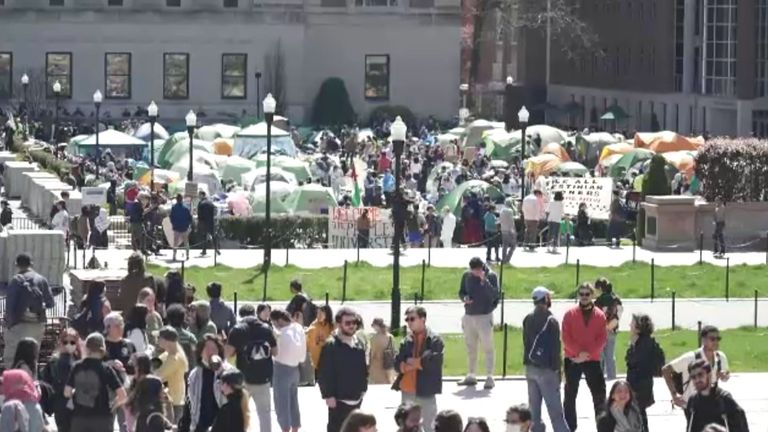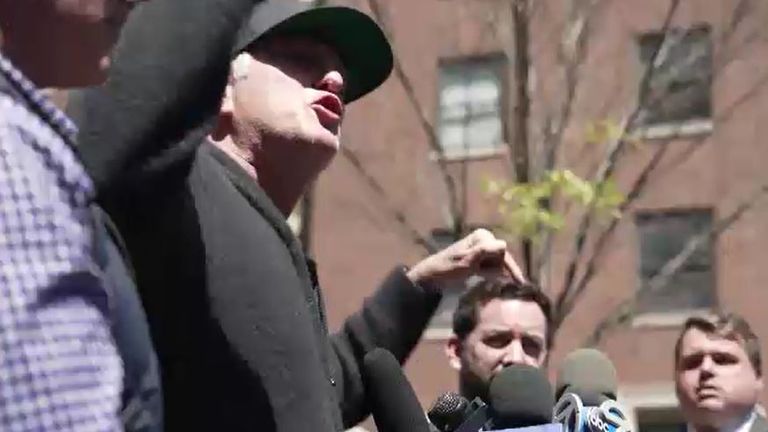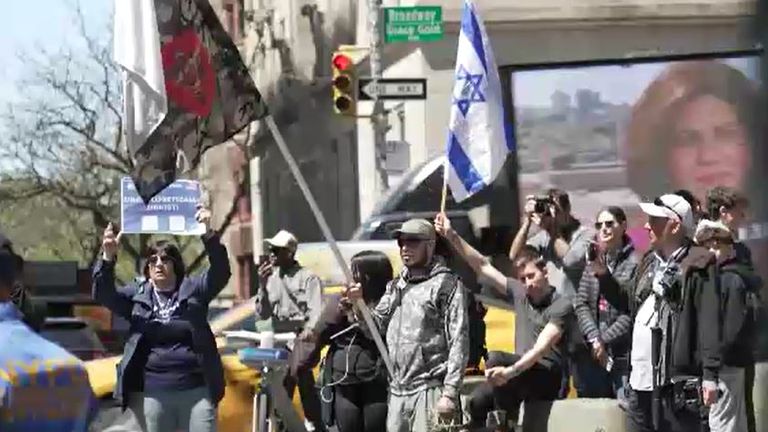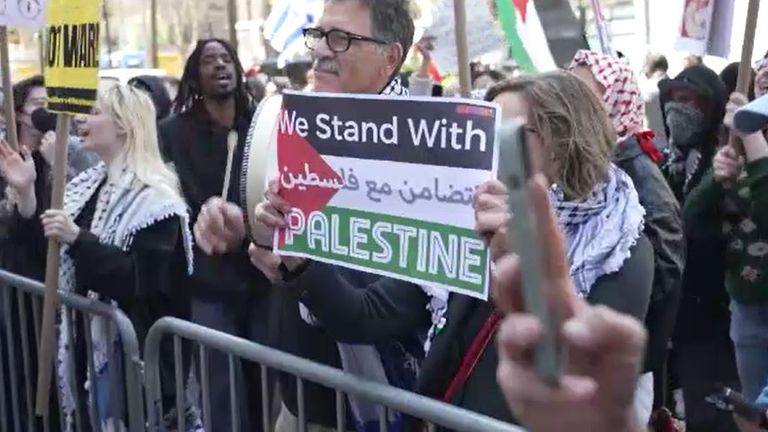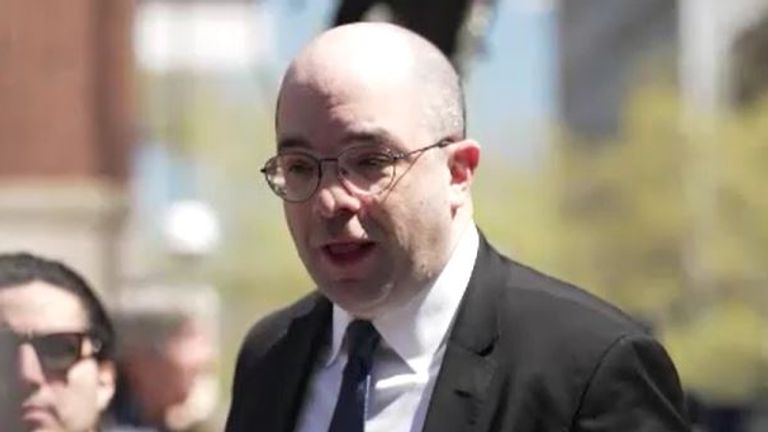In the fog of a time which feels deeply discombobulating for so many groups of people, it’s vital to see and hear what’s going on up close.
It’s a fearful time for many. Positions are entrenched, views are polarised and emotions are very high.
And in that environment, issues can be conflated, judgements can be rash and deeply complex issues can be condensed to their simplest, most digestible form.
There are a multitude of prisms through which people see things. Nuance is too often lost.
Columbia University on New York City’s upper west side is one of America’s most prestigious institutions.
It’s one of a number of Ivy League schools where protests against Israel’s war in Gaza have become a national issue confounding the police and splintering the politicians.
Those who look for nuance end up tied in knots as they seek balance.
“I condemn the antisemitic protests…” President Biden said in his latest comments on the growing movement, adding: “I also condemn those who don’t understand what’s going on with the Palestinians, and their, how they’re being…”
He failed to finish his sentence. There is an election coming. Being unequivocal, either way, isn’t an option.
From a surface level, some have concluded that all the student protesters are antisemitic terrorist sympathisers and/or all the vocal counter-protesters are genocide-condoning colonialist monsters. Of course neither is true.
What I saw from my albeit limited, allotted time on the Columbia campus was a spectrum.
Hollywood star blasts ‘lowlife scumbags’
There was the young Lebanese-American woman who wouldn’t bring herself to condemn Hamas. There was the young American man who just wanted “the genocide to end”.
There was the British professor of Middle Eastern history who sought to provide the context of a conflict stretching back so many years. And there were Jewish students whose message for Israel was “not in my name”.
The thrust of their demands was for the university to cut all links with Israel and to divest financially.
At a time when definitions are condensed, their views would, by some but not all, be interpreted as antisemitic or, in the case of the Jewish students, self-hating.
One Jewish-American politician, Bruce Blakeman, speaking on the street outside the campus, declared angrily: “They are traitors.”
Alongside him was actor and comedian Michael Rapaport who described the campus encampment protesters as: “bullies, cowards, and pathetic lowlife scumbags”.
Read more:
Baby saved from womb of mother killed in Israeli strike
Dozens arrested at Yale and Colombia cancels classes amid protest
Israeli intelligence chief quits over 7 October attack
University president warns of ‘clear and present’ danger
It is a deeply depressing statement of fact that some Jewish students and professors do not feel safe on their own campuses.
Shai Davidai, an assistant professor at Columbia Business School, wrote on X: “Earlier today, Columbia University refused to let me onto campus. Why? Because they cannot protect my safety as a Jewish professor. This is 1938.”
We are at another moment of febrile divisiveness and division where extremes are amplified and fear is visceral.
Slogans are interpreted as genocidal and they are compounded by the violent threats of a minority.
What was my campus takeaway, as an observer with no alliances but also no visual identifier – a kippah or a keffiyeh – to attract the potential ire of one side or the other?
Well, the prevailing vibe within my snapshot of the campus spectrum, which by definition has its extremes, was one of tolerance, with a call for an end to all killing and to occupation.
It did not chime with the way the university president had framed the situation just days ago: “A clear and present danger to the substantial functioning of the university.”
President Minouche Shafik, who is British-American-Egyptian and a member of the UK House of Lords, chose to call in the police last week to tackle the growing protest movement.
She had, the Associated Press reported, “focused her message on fighting antisemitism rather than protecting free speech”.
The thorny line between free speech and hate speech is a judgment so often left to the police.
It’s important to note that the police chief overseeing the Columbia arrests last week later said: “The students that were arrested were peaceful, offered no resistance whatsoever, and were saying what they wanted to say in a peaceful manner.”
Yet, in this febrile and condensed moment, they can be all of those things and, to the beholder, be antisemitic too.
At the heart of all this is the challenge of how to moderate the conversation; how to keep it moderate, when that now seems to be so open to interpretation.
As I write, news is emerging of more arrests, this time at another of the city’s universities, NYU. It is prompting angry reactions.
“NYU’s administration tonight joined the shameful list of US universities that called the police to arrest their own students and faculty for protesting against an ongoing genocide”, NYU professor Mohamad Bazzi posted on X.
Clara Weiss, the National Secretary of IYSSE, a student social equality movement wrote: “The Biden admin and the Democratic admin of NY and NYC have all backed a state crackdown but protests against the #Gazagenocide continue to grow and expand.”
I asked NYPD Deputy Commissioner Michael Gerber to characterise the challenge.
“It’s a great and important question,” he said.
“Determining when something goes from protected speech to unprotected speech can be very context specific; can require a lot of nuance. And you’re right, you have to make calls on a daily basis, making judgment calls. We’re doing it to the very best of our ability. [The] stakes are high, there’s no question about that.”
It is, then, a balance between respecting free speech and restricting it.
It’s about finding the right tools to allow for a sober, objective deciphering of the red line which lies between free speech and hate speech.

